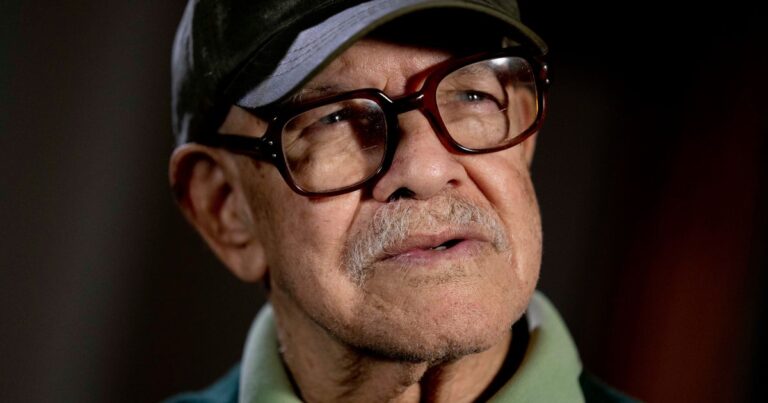
[ad_1]
WASHINGTON (AP) — Nearly 60 years after he was first recommended for the nation’s highest award for bravery during the Vietnam War, retired Col. Paris Davis, one of the first Black officers to lead a Special Forces team in combat, will receive the prestigious Medal of Honor on Friday.
The overdue recognition for the 83-year-old Virginia resident comes after his recommendation for the medal was lost, resubmitted — and then lost again.
It wasn’t until 2016 — half a century after Davis risked his life to save some of his men by fighting off the North Vietnamese — that a volunteer group of advocates painstakingly recreated and resubmitted the paperwork.
Some of Davis’ supporters believe racism was to blame, but Davis doesn’t dwell on it. He said he doesn’t know why it has taken decades for his heroism to be recognized.
“Right now I’m overwhelmed,” he told The Associated Press in an interview the day before he attends a White House ceremony where President Joe Biden will hang the blue ribbon holding the Medal of Honor around Davis’ neck.
“When you’re fighting, you’re not thinking about this moment,” Davis said. “You’re just trying to get through that moment.”
That moment lasted nearly 19 hours and stretched over two days in mid-June 1965.
Davis, then a captain and commander with the 5th Special Forces Group, engaged in nearly continuous combat during a pre-dawn raid on a North Vietnamese army camp in the village of Bong Son in Binh Dinh province.

He led the charge against the enemy, called for precision artillery fire, engaged in hand-to-hand combat with the North Vietnamese and thwarted the capture of three American soldiers — all while suffering multiple wounds from gunshots and grenade fragments. Davis used his pinkie finger to fire his rifle after his hand was shattered by an enemy grenade, according to reports.
Davis repeatedly sprinted into an open rice paddy to rescue each member of his team, according to the ArmyTimes. His entire team survived. Davis refused to leave the battlefield until his men were safely removed.
Davis, a native of Cleveland, retired in 1985 at the rank of colonel and now lives in Alexandria, Virginia, just outside Washington. Biden called him several weeks ago to deliver the news.
He compares receiving the medal to getting a long-anticipated ice cream cone and says the wait in no way lessens the honor.
“It’s just the antithesis of that,” he said. “It heightens the thing, if you’ve got to wait that long … It’s like someone promised you an ice cream cone. You know what it looks like, what it smells like. You just haven’t licked it.”
Davis’ commanding officer recommended him for the military’s top honor, but the paperwork disappeared. He eventually was awarded a Silver Star Medal, the military’s third-highest combat medal, as an interim honor, but members of Davis’ team have argued that his skin color was a factor in the disappearance of his Medal of Honor recommendation.
“I believe that someone purposely lost the paperwork,” Ron Deis, a junior member of Davis’ team in Bong Son, told the AP in a separate interview.
Deis, now 79, helped compile the recommendation that was submitted in 2016. He said he knew Davis had been recommended for the Medal of Honor shortly after the battle in 1965 and he spent years wondering why Davis hadn’t been awarded the medal. Nine years ago he learned that a second nomination had been submitted “and that also was somehow, quote, lost.”

“But I don’t believe they were lost,” Deis said. “I believe they were intentionally discarded. They were discarded because he was Black, and that’s the only conclusion that I can come to.”
Army officials say there is no evidence of racism in Davis’ case.
“We’re here to celebrate the fact that he got the award, long time coming,” Maj. Gen. Patrick Roberson, deputy commanding general, U.S. Army Special Operations Command, told the AP. “We, the Army, you know, we haven’t been able to see anything that would say, ‘Hey, this is racism.’”
“We can’t know that,” Roberson said.
In early 2021, Christopher Miller, then the acting defense secretary, ordered an expedited review of Davis’ case. He argued in an opinion column later that year that awarding Davis the Medal of Honor would address an injustice.
“Some issues in our nation rise above partisanship,” Miller wrote. “The Davis case meets that standard.”
Davis’ daughter, Regan Davis Hopper, a mom of two teenage sons, told the AP that she only learned of her dad’s heroism in 2019. But, like him, she said she tries not to dwell on her disappointment in how the situation was handled.
“I try not to think about that. I try not to let that weigh me down and make me lose the thrill and excitement of the moment,” Hopper said. “I think that’s most important, to just look ahead and think about how exciting it is for America to meet my dad for the first time. I’m just proud of him.”
[ad_2]